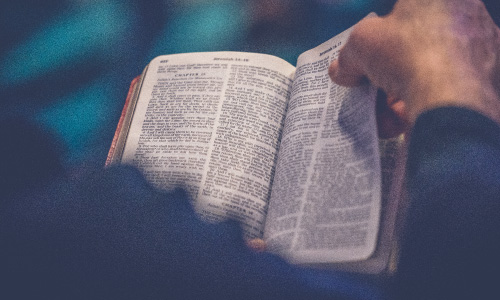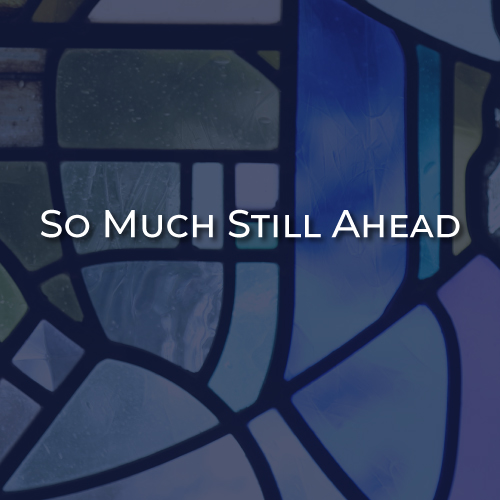Day 17
Posted on: March 5, 2024
by: Gerrit Dawson, Senior Pastor
by: Gerrit Dawson, Senior Pastor
DAY 17 TUESDAY
A Song in the Upper Room
 Ahuva Klein. The Four Languages of Redemption.
Ahuva Klein. The Four Languages of Redemption.
Imagine standing with Jesus, right next to him, in prayer to his Father. Read this passage of praise aloud. As you do so, consider that you are praying along with Jesus, your two voices becoming one as you bless God.
Bless the LORD, O my soul,
and all that is within me,
bless his holy name!
Bless the LORD, O my soul,
and forget not all his benefits,
who forgives all your iniquity
who heals all your diseases,
who redeems your life from the pit,
who crowns you with steadfast love and mercy,
who satisfies you with good
so that your youth is renewed like the eagle’s. (Psalm 103:1-5)
Psalm 116:12-19
What shall I render to the LORD
for all his benefits to me?
I will lift up the cup of salvation
and call on the name of the LORD,
I will pay my vows to the LORD
in the presence of all his people.
Precious in the sight of the LORD
is the death of his saints.
O LORD, I am your servant;
I am your servant, the son of your maidservant.
You have loosed my bonds.
I will offer to you the sacrifice of thanksgiving
and call on the name of the LORD.
I will pay my vows to the LORD
in the presence of all his people,
in the courts of the house of the LORD,
in your midst, O Jerusalem.
Praise the LORD!
What Is This Psalm About?
The joyful thanks for deliverance in Psalm 116 befits its place in the Hallel psalms, the six songs recited at all the major Jewish festivals. The first half of this prayer gives thanks to the LORD for deliverance from a deadly circumstance. We’ll consider it more deeply on our last day as a fitting summary of our Lenten prayers.
Today, we turn to the second half in which the psalmist makes a return of commitment to the LORD in praising gratitude. In particular, we focus on what it meant that Jesus and his disciples prayed aloud, “I will lift up the cup of salvation” just minutes before or after Jesus turned that Passover into his Supper, the first Holy Communion.
What Might This Psalm Have Meant to Jesus?
Every faithful Jew knew the Hallel psalms, and so Jesus has Psalm 116 in his heart and on his lips as he enters Passover week. From the beginning of his mission, he has known that opposition from the authorities would lead to his death, and Jesus anticipates that he will be crucified this week. He will be the true Passover Lamb whose blood covers sins. He will become the Passover for his people as he passes through death to life, taking all who are joined to him on the same journey.
Psalm 116 helps him prepare for the intensity of anguish, both spiritual and physical, that the cross will bring. It gives him lyrics for the sorrow of his rejection and the hope of coming out alive on the other side. Jesus also finds language for the commitment required of him as he obeys the Father unto death. His sacrifice will be in the context of gratitude for the LORD’s faithfulness in the past and in the joy of trusting fully in the deliverance to come.
On Thursday night, as he keeps the Passover with his disciples, Jesus shares with them the traditional four cups of wine. The third cup follows the actual meal. This is the cup with two names: 1) the cup of blessing to God offered in gratitude for the supper as well as the history it celebrates and 2) the cup of redemption, based on the third of four promises in Exodus 6:6, “I will redeem you with an outstretched arm and with great acts of judgment.” At this point, Jesus interrupts the ancient liturgy and re-interprets the moment saying, “This is my blood of the covenant, which is poured out for many for the forgiveness of sins” (Matthew 26:28).
The cup of Jesus’ suffering is the cup of salvation for us. The wrath he drinks in the cup of judgment becomes the goblet of the wine of our new life. A great exchange is occurring. Jesus drinks judgment as if he were no better than an Egyptian enslaver centuries before. Then he offers us redeeming freedom from deserved judgment and into a renewed covenant life as his Father’s people.
How poignant and perfect for Jesus to pray these words in that very hour to the LORD I AM whom he knows intimately as Father! He resolves to go forward from this brief fellowship to the horrible Golgotha in the same spirit of the psalmist’s words: “I will pay my vows to [my Father] in the presence of all [the] people. Precious in the sight of [my Father] is the death of his saints. O [my Father], I am your servant. . . . I will offer to you the sacrifice of thanksgiving. . . .”
When we hear Jesus lead the praying of this psalm in this of all moments, we glean how thanks and sorrow, resolve and hope, determined obedience and loving trust all go together. For all the reasons Psalm 116 was first written through its application to countless lives through the centuries, this hour is the deepest, truest reason the Spirit inspired such words. Here is the heart of the mystery of our faith in the quiet of the Upper Room. The historic Passover becomes the first Eucharist. Jesus pulls hard on the promised deliverance even as he offers himself utterly in commitment to the devastating day that awaits.
We join with Jesus in this Passover prayer and enter the wonder of his sacrifice. Paul describes this as the essence of life in Christ, declaring, “For none of us lives to himself, and none of us dies to himself. For if we live, we live to the Lord, and if we die, we die to the Lord. So then, whether we live or whether we die, we are the Lord’s. For to this end, Christ died and lived again, that he might be Lord both of the dead and of the living” (Romans 14:7- 9).
Praying with Jesus
I go in mind and heart to the Upper Room with you.
In the face of the beautiful mystery of your love,
I pray the words of your servant Paul,
“The cup of blessing which we bless,
Is it not a participation in the blood of Christ?”
I answer his question, “It is!” I don’t know how,
But I see you lift the cup of salvation
And offer it freely.
You are offering yourself, and I pine
To take a drink from that goblet. To cry,
It is! It is a communion in your blood!
As I drink, I know that I must render thanks
For so great a gift through the offering of my life.
One blood with you, I pray this psalm after you,
I will call on the name of the LORD,
Your blessed name Lord Jesus Christ,
Proclaiming your great deliverance
In worship, in conversation, in witness.
Precious is the death of the LORD’s faithful one,
Precious is the blood you shed in pain
Which comes to me as the wine of forgiveness.
Posted in:
Lent




 Close
Close









.jpg)

